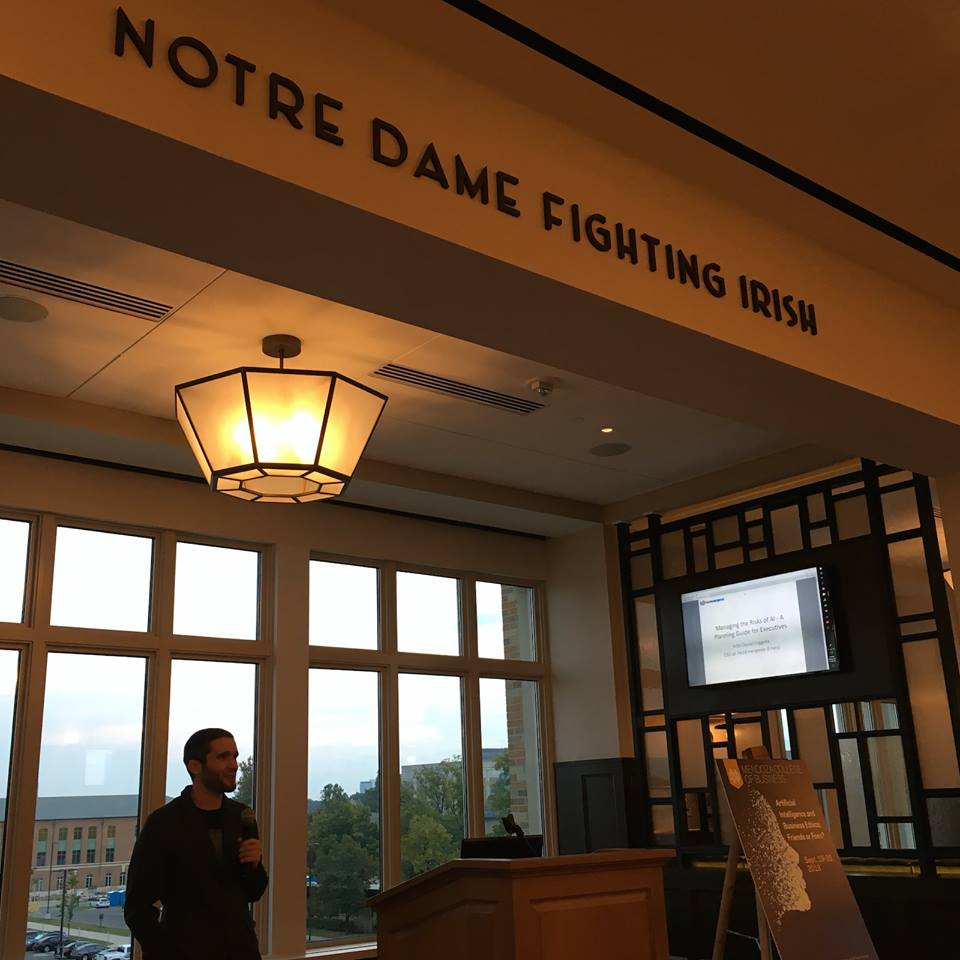
Event Title: Artificial Intelligence and Business Ethics: Friends or Foes?
Event Host: the University of Notre Dame, Mendoza School of Business
Date: September 19, 2018
Team Member: Daniel Faggella, Emerj Founder and CEO
What Happened
Four years ago, we spent more time talking about the ethical and social implications of AI in the long-term as opposed to the industrial applications of AI. We were interviewing people like Nick Bostrom and Nayef Al Rodham, people that I still respect greatly. That’s still where the majority of my focus is: the long-term ultimate consequences for intelligent life.

When the University of Notre Dame, Mendoza School of Business decided to have an event around AI and ethics, a professor who had been following us for four years wanted me to give the first presentation of the event, to tee up the event with a landscape of the realistic ethical concerns for executives.
I prepared a presentation and that laid out the practical and economic considerations of privacy and transparency with respect to AI, as well as the relative accountability of man and machine. I also provided a number of different use cases where an executive would have to make a decision and explain how certain decisions could be made more or less difficult depending on the different ethical concerns involved.
Mendoza School of Business has a big center for business ethics funded by Deloitte. The audience was primarily professors, MBAs, grad students, and undergrads who were interested in the cutting-edge of AI and its impact on ethics. My presentation ran about 30 minutes, and I answered questions afterward for an hour straight.
These questions ranged from a definition of machine learning to specific use cases for AI, what’s right and what’s wrong in terms of product recommendations and accountability, and the applications of AI in healthcare, finance, and other sectors. The questions came from a “what should we do” perspective, so to speak. It was great to see that amount of interest. We went far into over time.
What We Learned
I see a lot more unfettered interest in ethics in the academic world than I do in the business world. I don’t think you could fill a business audience with just the value proposition of ethics right now, primarily because business leaders need to see a return on investment from an event. An executive audience really requires practical insights much more so than conceptual ethics dialogue.
As a result, I think that a lot of the push for AI and ethics is going to come from the academic world and from people that don’t have a responsibility to employees. For them, it might seem like doing good to focus on ethics as opposed to focusing on profit. On the other hand, it’s a little bit of a false virtue because, of course, if one was running a company and thought not making a profit was virtuous, they’d quickly learn that they’re wrong. As students and professors, it’s a little bit easier to focus exclusively on the loftier elements of ethics and that social pressure, and it’s that social pressure that’s really trickling its way into the business world.
It’s not the business people saying, “We should all focus on ethics concerns.” It’s all these different AI centers and spinoff events like what I saw at Notre Dame. A lot of it’s starting in the academic world. There’s the Future of Humanity Institute at Oxford, the Leverhulme Institute, Carnegie Mellon’s AI in ethics branch, and MIT with these kinds of initiatives.
Right now, I think a lot of it really doesn’t crossover that closely to the practicalities of running a business day to day; however, I do think that it will over time. I’m frankly pretty grateful that these conversations are starting now because I think on the aggregate, even though it’s not tremendously pragmatic for executives to think about these things in an “ivory tower” sense, it does make sense that these conversations are being held and that they’re trickling their way into not just academia, but into governance, policy, and what not.
When I was at the United Nations, they were thinking about these things. The people at the World Bank are thinking about these things. I think it’s going to trickle down from there. It seems like this is an initiative that Notre Dame wants to repeat in future years, and I think that that will be a great way to continue getting this ball rolling.
I think as these ethical concerns become more and more prominent, we’ll have more and more need for initiatives of this kind, but it really became evident at Notre Dame that talk about these matters is really going to come from academia, not from the enterprise. But I think on the whole, everybody will win. We’re building towards a world where these things will be very important pragmatically. So, starting early is, to me, an aggregate good.
Header Image Credit: QuestBridge







